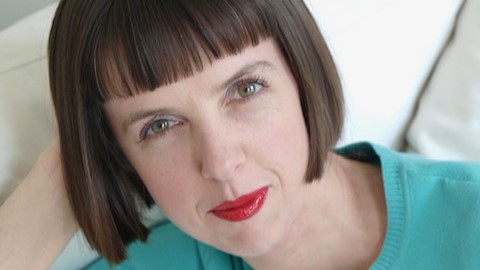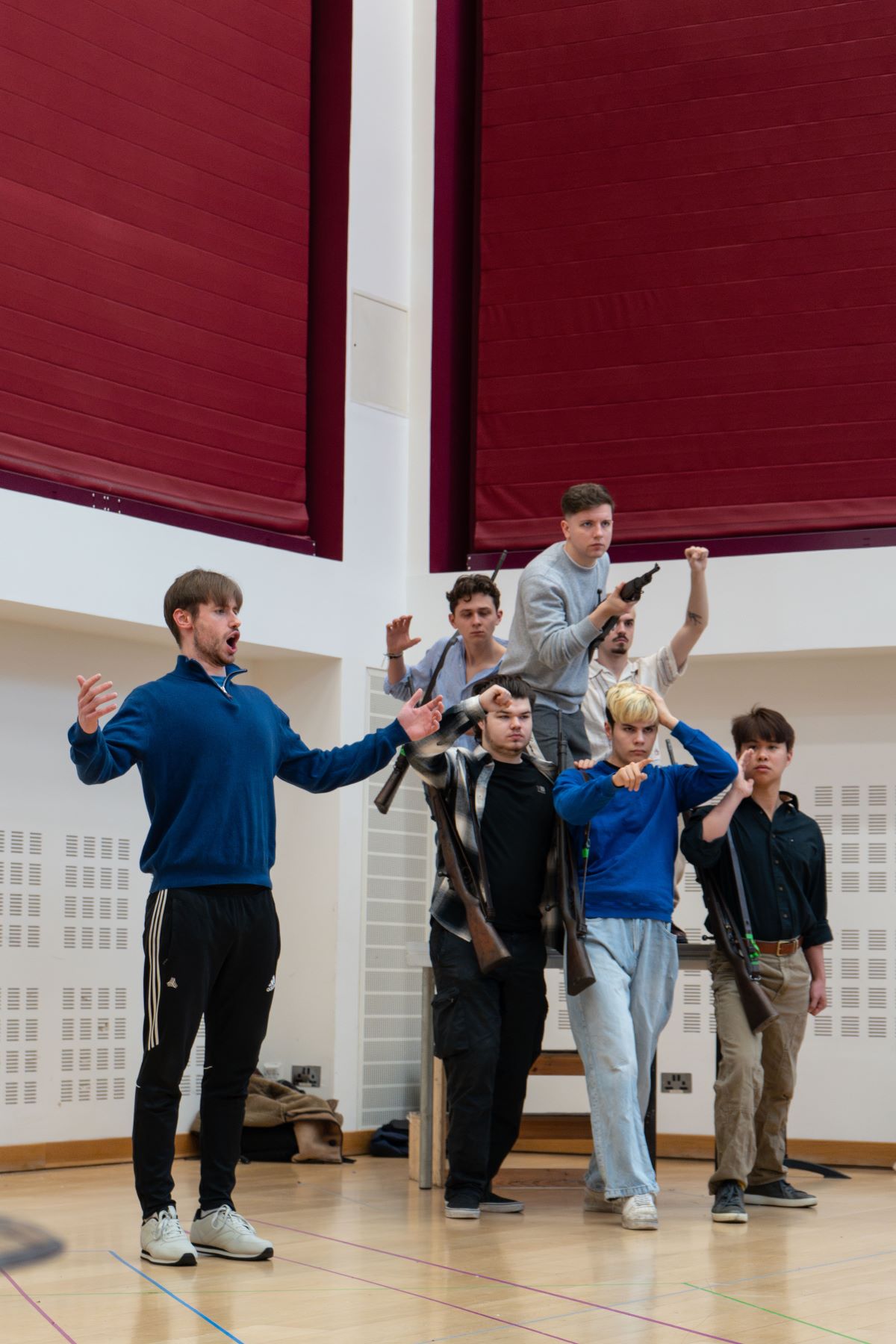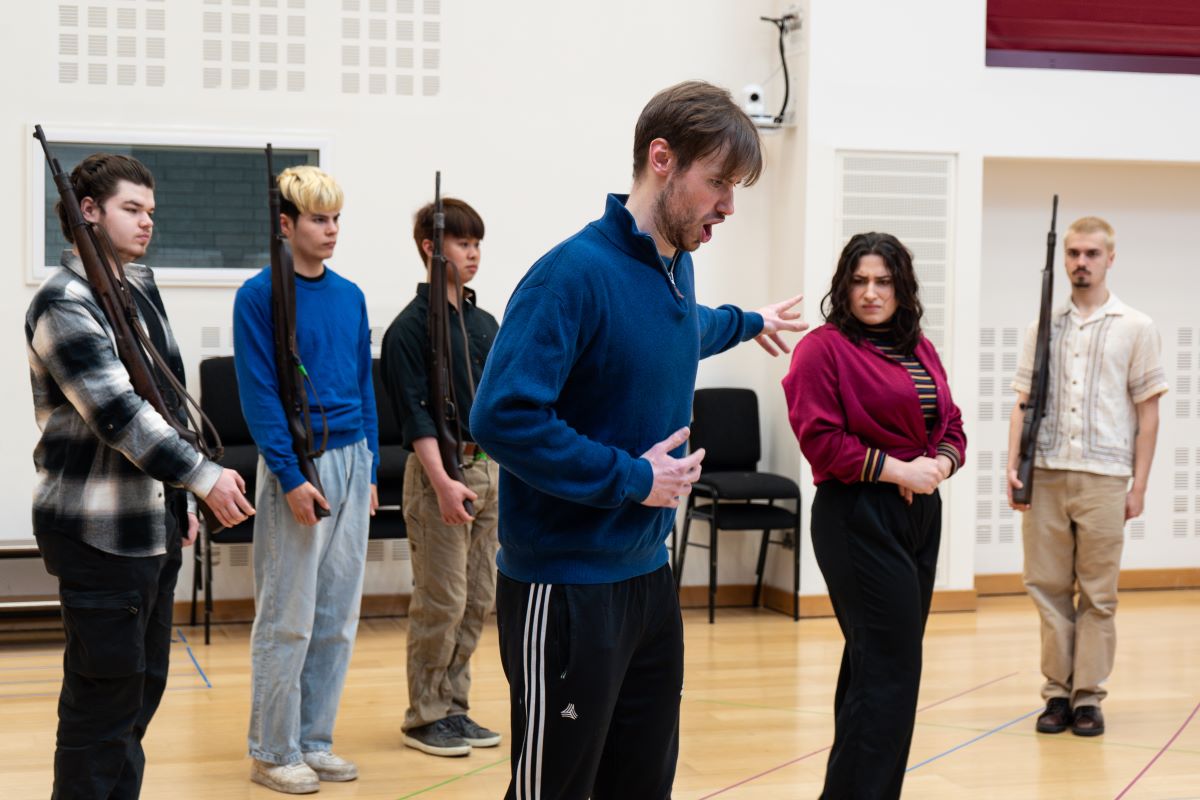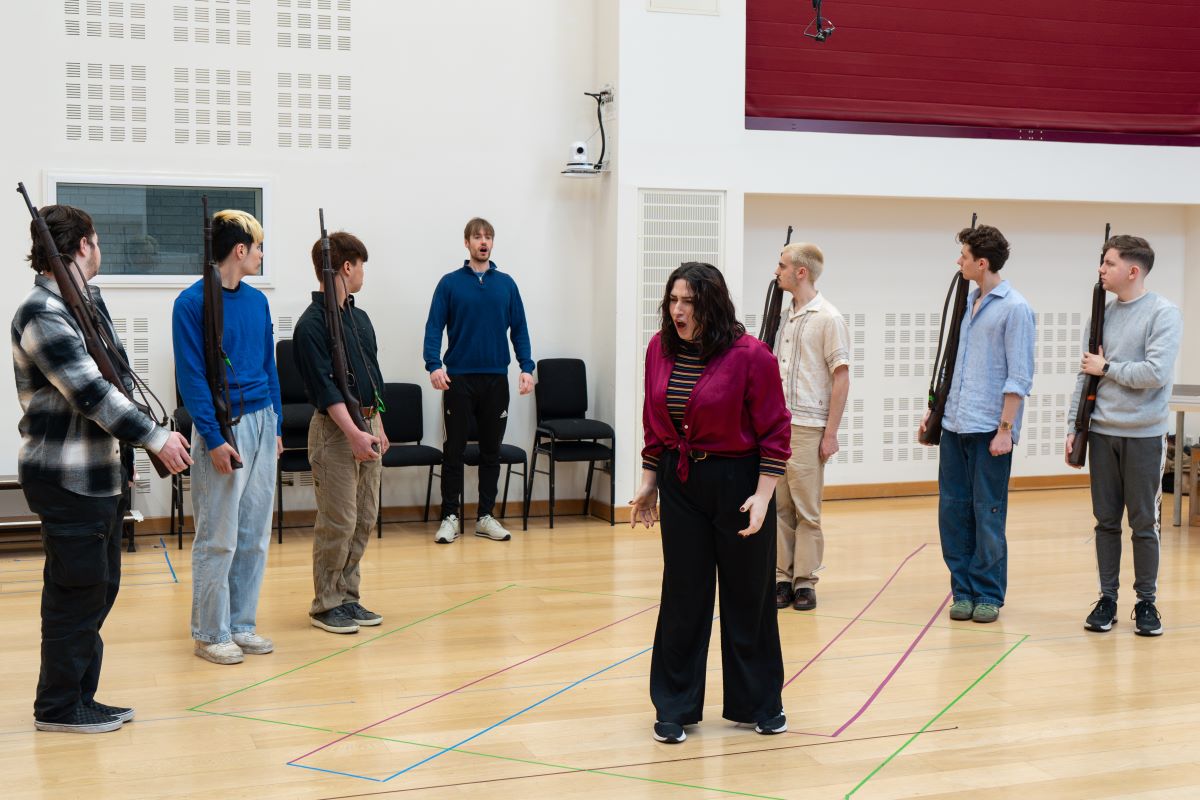Interview with Orpha Phelan, Director

By Sarah Walters
Internationally renowned director Orpha Phelan returns to the RNCM this month to bring Benjamin Britten’s groundbreaking opera for television, Owen Wingrave, to the stage. Her career has taken her everywhere from London’s Barbican to the Sydney Opera House and includes a previous collaboration with the College in 2019, when she directed Francis Poulenc’s Dialogues des Carmélites.
Owen Wingrave runs from Sun 30 Mar – Sat 5 Apr at the RNCM Theatre, and Orpha took a moment out of rehearsals to talk about her process, her love of Britten, and the future health of opera.
Q: How are you bringing Britten’s groundbreaking TV opera to stage?
The opera tells the story of how the youngest member of a military family, Owen, rejects the soldiering life. Britten gives Owen’s military ancestors specific musical motifs which we hear again and again through the opera, while he and his librettist, Myfanwy Piper, intended for the ancestors to appear in the original TV production through specific family portraits. Using portraits was a wonderful device for the TV, but in a theatre – where you’re communicating in a much bigger space with no close ups – we thought it would be interesting to have these ancestors actually appear on stage, in the form of ghosts. So, in our production, we have eight principals and six ghosts, one of whom is also a narrator.
The ghosts are those of soldiers past. We won’t necessarily recognise them as individual family members – we won’t think, ‘Oh, that person goes with that chord’. But what we will get is a real sense of the spookiness and the mystery of the family home, Paramore, and its omnipresent ancestors. These ghosts are unsettling, unnerving, even intimidating at times. They are, in a way, as powerful and as influential as the living family members themselves who, feeling rejected by Owen, attempt to intimidate and bully him into submission. In fact, these ghosts, all of whom we imagine died on the battlefield, are in some ways more potent than the living characters, because as the opera progresses we sense that they support Owen’s belief that war is futile.
What’s remarkable about the piece is that, in some senses, almost nothing happens! The big decision, that being Owen’s choice to leave the military life and turn his back on family tradition, has been made before the opera begins. Owen’s journey, then, is simply in his effort to convince his family that his decision is valid. The family are steadfast in their disapproval, refusing to allow him to defend himself and eventually disinheriting him. If anyone goes on a journey, it’s Spencer Coyle, Owen’s teacher; although he struggles with Owen’s decision, he believes that Owen is entitled to make his own choice.
We’re setting it in 1910, so that’s before the Battle of the Somme. If there’s any chance of audiences having any sympathy with the family, it’s because the family don’t know what’s about to come. We the audience understand, even if they don’t, that they are preparing these young, brilliant men to be cannon fodder.

Q: How does Britten use ghosts as a narrative device to engage audiences with the story?
The central mystery of Paramore involves two particular ghosts: Owen’s great, great grandfather, Colonel Wingrave, and his young son. According to the legend of the house, when the little boy refused to engage in a fight with his friend, his father struck him and this blow resulted in the boy’s death. That in itself is a powerful story, but even more disturbing is the fact that the murdering father died shortly afterwards. He was found ‘lifeless, on the ground of that same room’, without a wound. From the moment we arrive in Paramore, we fear the ghosts of the house and we fear this haunted room – so much so that, when Owen is challenged to sleep in it to prove that he is not a coward, we sense that no good will come of it. Ultimately, Owen is the same as the little boy – he is punished for refusing to fight. And he dies in the same room as his great, great grandfather. We don’t know why, we don’t know how. It’s great stuff for the audience to ponder on!
There’s a morbid fascination in Paramore with death and with sacrifice and with the glory of the soldiering life. The house is run by three women: Mrs Julian, Miss Wingrave, and Kate, all of whom have lost family in battle. The women are wedded to the ghosts of the past. There’s an irony there in that the women are more warmongering than the men who have died in service. These women seem to want Owen to die in battle in order to continue to carry the Wingrave flag of glory. The act of sacrifice is worth more than the man himself because it gives credibility to the losses that they have suffered to date. As soon as Owen begins to lose trust in the notion of war, he undermines everything that the family has fought for and lost.
Q: Owen Wingrave was conceived for television; what is the impact of that on the storytelling and narrative approach?
I mentioned the ancestral portraits, which were part and parcel of the storytelling for TV, and it’s been wonderful coming up with an alternative for stage. Our ghosts are magnificent and bring a real sense of pathos and tragedy to our production.
For me, one of the joys of Britten is that there’s usually room for interpretation, with lots of grey areas. Did Peter Grimes kill the boy? Did Captain Vere make the right call in Billy Budd? What happens in Owen Wingrave is less subtle – the characters are more black and white. Owen is “good” while the family are unrelentingly “bad”. I wonder if that’s because Britten was writing for a TV audience and felt that he needed to be less obtuse. But then, it’s also some of his most challenging music – he certainly didn’t go easy on the audience musically! In any case, I think that our ghosts help relieve the endless ranting of the family and give us people with whom we can empathise.
Q: How have you worked with the students to bring Owen Wingrave to stage?
They’ve all read, with great enthusiasm, the novel by Henry James, so they’re all coming to rehearsals not only well prepared musically but also with a backstory. They’ve been thinking deeply about their characters and it’s been lovely to see them extend those ideas into their conversations with each other. We’ve had a lot of chats about motivation and also considered this opera in terms of what happens between scenes; time passes, and so we’ve done some improvisations about conversations that might have been had in those missing moments.

Q: Does working with vocal students who are still in training have any impact on your approach?
Each opera is different of course. Albert Herring, for example, which I directed at the Royal Academy a year ago, couldn’t be more different to Owen Wingrave, and so each requires a different approach. For Albert HerringI, I arrived in rehearsals with almost every bar choreographed in advance, while it has been more of a conversation for Owen Wingrave. I always approach work according to the demands of the piece, whether the performers are students or seasoned professionals. One of the things I love about working with students is that they haven’t done the roles before so they don’t come to a piece with preconceptions. They don’t say: ‘Oh, the last time I did this, we did this – it was much easier.’ Instead, they’re eager, open, hungry – and that’s just great.
Most young singers are not experienced so it’s our job to nurture them. But it’s also our job to prepare them for the professional world in which allowances won’t be made if they’re not well prepared or ready to dive into a character. One of Coyle’s lines is: ‘My task is to instil a needed discipline, a core of ordered facts to set reality beside their gallant dreams, and yet not cool the hero’s blood that makes me choose to teach them.’
The students have an energy which is really infectious, and part of my job is to harness that, but also to train them to be professionals so that they can make a living. Sometimes that’s simply about making it really clear to them that if they are 10 minutes early for a rehearsal, they’re simply on time, and if they’re walking through the door a minute before we are due to start, they’re late. And if they’re late, they won’t be employed again!
Q: Is student interest in performing opera still strong? What do they tell you about their interest in it?
I think student interest in performing opera is stronger than ever. It seems that there are many contenders for every place on a course, and for every audition. The students seem to be truly invested in approaching roles holistically, rather than just from the dots on the page. Gone are the days when it was good enough to have people singing up front in pretty costumes; they understand that they have a vital role in making opera relevant and accessible.
Opera has definitely evolved. A hundred years ago, the role of the director barely existed and the singers directed themselves. But now people watch so much good drama on television, there is an expectation of gripping performances on stage too; a good voice is not enough. The students know that there also needs to be a cohesive and compelling concept. Whether traditional or contemporary, all productions do have to speak to and take care of contemporary sensitivities – and young performers make sure that this happens!
Certain operas are much more difficult to perform now than they were – some operas have become almost unperformable. You ask yourself should the likes of these operas be relegated to museums? Should we never hear this music again? I believe that the answer is no – but it’s tricky.

Q: How is Britten regarded by modern audiences?
I can’t speak for audiences; I can only say what I think of Britten and he’s probably my favourite composer. Whenever I’m asked to direct a piece by Britten, the champagne is out! It’s such a gift to be given his work, and I feel jealous of anybody else who gets to do a piece that I haven’t done. I’m just gagging to do more! As I’ve said already, I love the nuance and lack of black and white in his pieces. But he’s also such a great painter of characters. They are deftly defined, not just by the words, but also with the music; he very cleverly uses musical motifs for each character. Through his unique orchestration and melodies, he gives real depth and insight to his characters, whoever they may be. It’s very easy to direct Britten; it’s a bit like Puccini in that it’s all very clear – it’s simply my job to bring that out.
Music is really important with all of my direction. I don’t do straight theatre; I only do opera, because for me the music is the answer to so much of what I am doing on stage. I begin the process by learning the opera from beginning to end. It is often difficult, intense, solitary work, but then rehearsals are usually joyful because the hard work is done. Once rehearsals start, I rarely need to refer to my score, because by then the piece is sort of a part of me.
Q: Do you remember when opera first affected you?
I grew up listening to opera. When I was little, my mum always had music playing; we listened to cassettes in the car and we had a large collection of records at home. I remember learning much of La traviata phonetically and acting it out on my own in the sitting room! I think the idea of make believe, and especially make believe through music, was with me from a young age. It’s really the only career I could have ended up in. I am living the dream!
Event Info
Britten: Owen Wingrave
Sun 30 Mar – Sat 5 Apr 2025
RNCM Theatre
Rehearsals images taken March 2025.
25 March 2025

